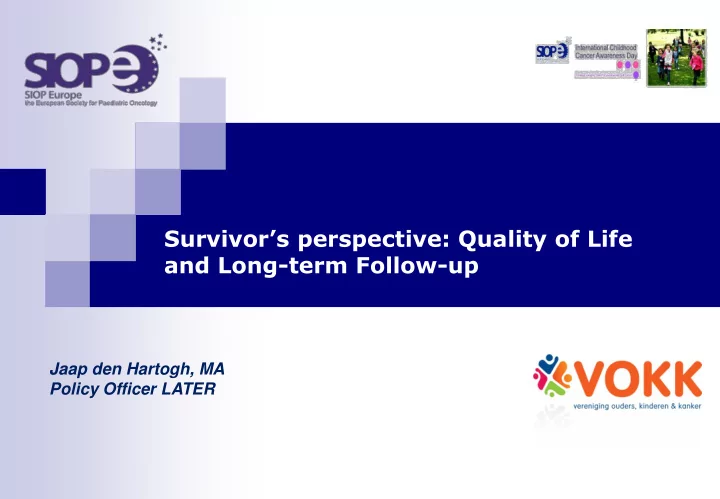

Survivor’s perspective: Quality of Life and Long-term Follow-up Jaap den Hartogh, MA Policy Officer LATER
Facts and numbers • Overall 5-year survival rate: 80% in developed countries • Better treatments and supportive care, only possible by research • Estimated 300-500,000 CCS in Europe • Another 10-12,000 new CCS each year • This has a price: late effects • Negative impact on quality of life
Quality of Life Quality of life: general well-being of individuals, in • this case CCS Medical late effects: • • Heart failure • Failure of the kidneys • Reduced fertility / infertility • Chronic fatigue • Secondary cancer Psychosocial late effects • • Self-esteem • Education • Work • Social network
Long-term follow-up care • Prevent and treat late effects • End-of-treatment summary is fundamental • Inequalities across Europe • Every survivor should have the right to receive such end-of-treatment summary to have good long-term follow-up care
Longterm follow-up studies • 15-20-30 years? • Connect treatment burden to actual long- term outcomes • Data protection: to do long-term follow-up studies, secondary use of data where no specific consent has previously been provided is required • DPR: Explicit and specific consent • Consequence: multiple requests and reminders, because a consent is necessary
Survivors’ perspective • Survivors deem it not to be reasonable to re-contact them systematically • Broader consent (i.e. one-time consent) • One-time consent at 18 could be an option • Donation of data, without much extra burden • Voluntariness at risk • Survivors want to live a normal life, to the degree possible • Psychological need to “move on”
The Survivorship Passport Developed by ENCCA and PanCare • Prototype with big potential • The Survivorship Passport provides a condensed end- • of-treatment summary: Risks related to treatment burden (surgery, • radiotherapy, chemotherapy) It is in my view important that the patient gets better • control on his/her data, think of eHealth Prototype • It aims to harmonize the follow-up care • Homogeneous criteria and evidence-based • guidelines
To conclude • End-of-treatment summary is fundamental for follow-up care • In long-term observational studies secondary use of data is required • Secondary consent is necessary • Survivors do not want to be overwhelmed with consents • Balance between right to privacy and right to health • A one-time consent (at the age of 18) is preferred by survivors
Thanks for your attention!
Recommend
More recommend